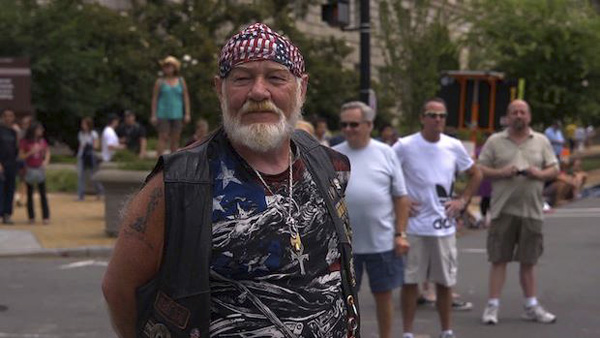![]() Stray Dog is a surprisingly touching road trip through the heart of America on a Harley-Davidson, where people in double-wides help each other as they struggle to get through posttraumatic stress disorder (PTSD), addictions, pain, Veterans Administration paperwork, health and immigration problems, intermittent minimum wage jobs, and underwater mortgages. It’s s unexpected because the titular force, Ron “Stray Dog” Hall, looks straight out of the fiction of TV’s Sons of Anarchy, or one of the guys in the Outlaw Motorcycle Gangs in the recent Waco, Texas, shootout, who are his antithesis.
Stray Dog is a surprisingly touching road trip through the heart of America on a Harley-Davidson, where people in double-wides help each other as they struggle to get through posttraumatic stress disorder (PTSD), addictions, pain, Veterans Administration paperwork, health and immigration problems, intermittent minimum wage jobs, and underwater mortgages. It’s s unexpected because the titular force, Ron “Stray Dog” Hall, looks straight out of the fiction of TV’s Sons of Anarchy, or one of the guys in the Outlaw Motorcycle Gangs in the recent Waco, Texas, shootout, who are his antithesis.
Director Debra Granik’s Winter’s Bone (2010) let loose an Oscar-nominated performance by Jennifer Lawrence that was especially set off by the verisimilitude of the rough-hewn people around her, including the scary-looking Ozarks crime boss played by Hall. But in following up with his real life, Granik’s documentary is a profound reminder that in movies, looks can be deceiving.
Granik gradually peels layers and layers off the big, bearded, tattooed, Harley riding Vietnam War vet living in a trailer park in southern Missouri. He first teaches us how cross-country motorcyclists join up with him for the “Run For the Wall,” a moving lesson of veterans bonding for those with belatedly-recognized PTSD and self-medicating addictions. They also remember those killed and missing in action or as POWs (with a motto of “We Ride For Those Who Can’t”). Their destination: the Vietnam Veterans Memorial Wall, where they seek out specific names. (A friend reported on the impressive sight when thousands and thousands of Rolling Thunder participants converged on Washington, D.C. for Memorial Day this year; press estimates ranged up to a million, including their families.)
On their ritualized stops to visit buddies and grave sites (including those who committed suicide), Hall and his friends constantly urge other veterans to join them. His tenderly thoughtful provision of emotional and practical aid for families is a heartbreaking reminder that many have been without the children who would have helped and supported them now in their elderly, straitened times. He goes a long way toward helping to ameliorate the gap that can never be filled in their lives.
Through extraordinarily intimate cinema verité, Granik goes beyond this affecting example of loyalty and patriotism to let Hall gradually defy stereotyped images of soldiers and masculinity. She exposes how Hall has therapeutically grappled with and overcome his difficulties by rebuilding and sharing his life over the years with altruism and with an unexpected new love he met in Mexico. His heart seems to expand on screen as his new relationship surmounts limited English (they are each trying to learn the other’s language), cross-border bureaucracy, and the baggage of her teenage sons, who have different notions of freedom and the American Dream.
This is an insightful ride through a slice of Americana and an authentic alternative to the manipulated anthropology of reality TV.







Leave A Comment